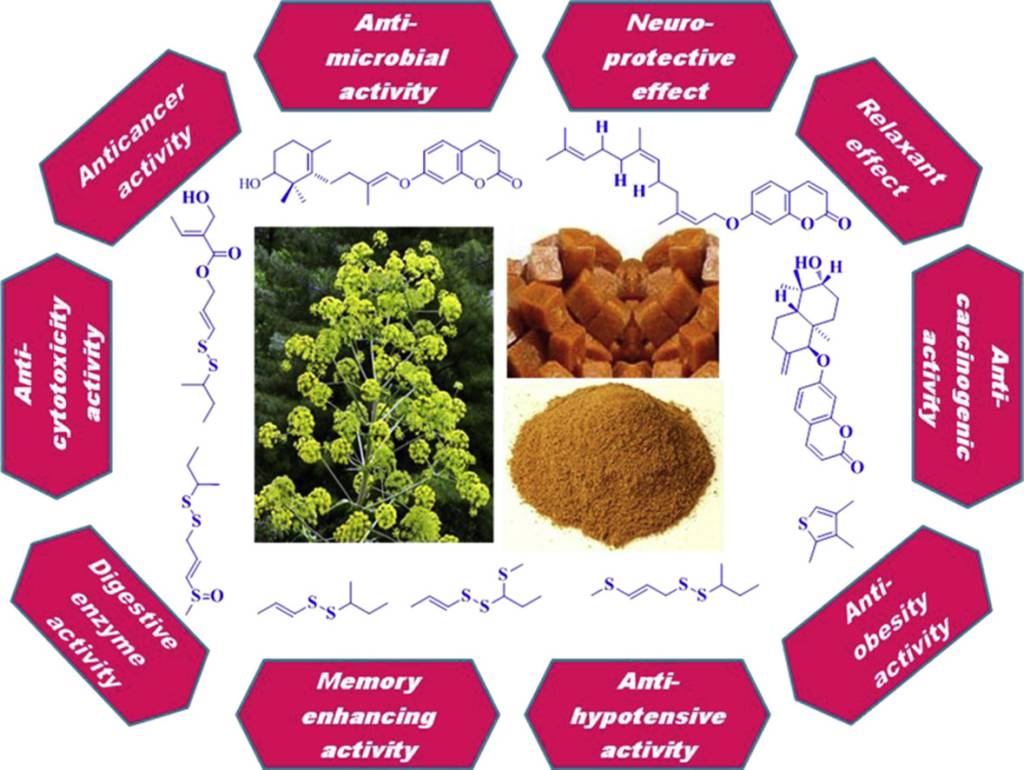Asafoetida
Ferula asafoetida Linn. is the main source of asafoetida, a resin with a strong, sulfurous odor, known for its medicinal and nutritional benefits. Used as a spice and in traditional medicine for centuries, recent studies have highlighted its various beneficial properties, such as relaxing muscles, protecting nerves, enhancing memory, aiding digestion, providing antioxidants, relieving spasms, lowering blood pressure, protecting the liver, fighting microbes, and having anti-cancer, anti-obesity, and anti-parasitic effects. This review covers the plant’s chemical makeup and its various health benefits.
Asafoetida is a complex mixture of compounds obtained from the resin of the Ferula asafoetida plant. The main components of asafoetida include:
Sulfur-containing compounds: Dimethyl trisulfide, diethyl disulfide, and other sulfur-containing compounds are responsible for its characteristic strong, pungent odor.
Phenolic compounds: Tannins, flavonoids, and other phenolic compounds contribute to its antioxidant and anti-inflammatory properties.
Essential oils: Pinene, limonene, and vanillin are present in smaller amounts, imparting a pleasant aroma to the spice.
Other compounds: Gum arabic, fibers, and proteins are also present in the resin.
Pharmacological Activity
Asafoetida has been traditionally used for various medicinal purposes, including:
Digestive aid: Asafoetida is used to relieve digestive issues, such as flatulence, bloating, and indigestion.
Antispasmodic: Its antispasmodic properties help to relax smooth muscles and relieve symptoms of asthma, bronchitis, and whooping cough.
Expectorant: Asafoetida helps to loosen and clear mucus from the respiratory tract.
Antioxidant: Its phenolic compounds exhibit antioxidant activity, which may help protect against chronic diseases such as heart disease, cancer, and type 2 diabetes.
Traditional Uses
Asafoetida has been used in traditional medicine for centuries, particularly in Indian and Unani systems of medicine. It is used to treat a range of conditions, including:
- Hysteria and nervous conditions
- Bronchitis, asthma, and whooping cough
- Digestive issues, such as flatulence and indigestion
- Menstrual disorders and uterine problems
Commercial Forms
Asafoetida is available in various commercial forms, including:
- Powdered asafoetida: Made by blending natural asafoetida with gum arabic and flour.
- Compounded asafoetida: A blend of asafoetida with other spices and ingredients, used in cooking and medicine.
- Essential oil: Extracted from the resin, used in aromatherapy and perfumery.
Note: The information provided is based on the search results and does not constitute medical advice. Asafoetida should be used under the guidance of a healthcare professional, especially for medicinal purposes
C/o- https://www.sciencedirect.com/science/article/pii/S2225411016302863
and Brave search







